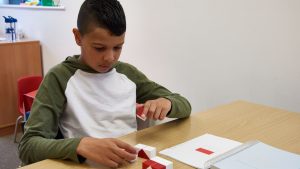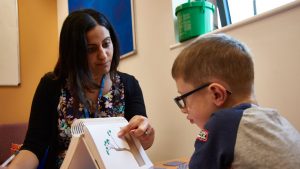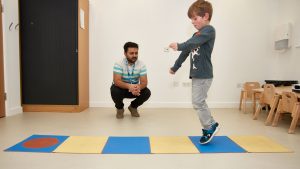About the Specialist Assessment Service
Who we are…
We are a team of specialists working for the University Hospitals Birmingham NHS Foundation Trust. The members of team include a Clinical Lead, Clinical Psychologists, Speech and Language Therapists, Occupational Therapists, Physiotherapists, an Educational Psychologist, a Child and Adolescent Psychotherapist, Consultant Paediatricians, a Child and Adolescent Psychiatrist and Administrative staff.
Further Information about the service and what will happen at an assessment can be found on the documents below.
- SAS Information Sheet
- Specialist Assessment Service Frequently Asked Questions (last updated September 2020)
- Specialist Assessment Service Complex Medical Needs Frequently Asked Questions (last updated April 2020)
Clinical Team Lead – Claire Howell
The role of the Clinical Team Lead is to lead and manage the team and to work with parents and carers if there are any difficulties before or during the assessment process. Claire’s role includes ensuring the team has the resources it needs to provide a quality service and working in a coordinated way with key partners across Solihull’s Children’s Services. Claire also carries out some clinical work with the Autism Team.
Autism Team
The SAS Autism Team is a diagnostic service. We are not able to offer on-going support for children, young people and families beyond the conclusion of our assessment however during your assessment we will talk to you about and signpost to support services available locally and nationally.
Case Leads for Autism Assessment
Most members of the Specialist Assessment Service Autism Assessment Team work as Case Leads. In this service, Case Leads support children, young people and their families through the assessment process.
The process involves completion of assessment to make a diagnostic decision of whether a child or young person presenting with difficulties in their communication, social interaction and/or flexibility of thought and behaviour meets the criteria for an underlying Autism Spectrum Disorder.
When required, Case Leads are able to consult with or request further assessment from team members from different professions in order to gain a full picture of a child/young person’s strengths and areas of differences. As part of the assessment Case Leads will liaise with other professionals involved and meet with children/young people and/or their parents/carers to discuss the outcome of the assessment and agree on recommendations for on-going support.
A child/young person’s Case Lead will be the main point of contact for the family or other professionals who contact the Specialist Assessment Service during the assessment process.
Psychology
What do Psychologists do?
Psychologists are interested in the thoughts and feelings that people have that can result in the behaviours that they display; understanding the reason for why people do what they do. They think about factors that have created the difficult thoughts and feelings that a person may have, such as differences in how their brain works, difficult experiences that they have had and any other factors related to relationships they have or have had with others. They work together with those they support to make sense of what is going on for them and to support them to achieve their goals.
What are the different types of Psychologist within the Specialist Assessment Service?
The Specialist Assessment Service employs two different types of Psychologist, Clinical and Educational.
Clinical Psychologists can work with anyone across the whole life span so are able to think about how to support not just the child and young person but also the wider family. They are trained in identifying and supporting people with a wide range of mental and physical health difficulties, neurodevelopmental disorders and relational issues. Clinical Psychologists use a wide range of assessment methods to help understand the strengths and needs of individuals, families and/or systems and use formulation to summarise and make sense of this assessment information to provide relevant and effective interventions.
Educational psychologists support children and young people with learning difficulties, mental health difficulties, issues around disability as well as more complex developmental disorders. They work in a variety of ways including the use of observations, consultations and assessments. They also offer support and advice to teachers, parents, the wider community as well as children and young people.
Whilst the training for Clinical and Educational Psychology is quite different, there is a lot of overlap in relation to skills and what they are able to offer services once qualified.
The role of Psychologists within the Specialist Assessment Service
Both Clinical and Educational Psychologists within the Specialist Assessment Service Autism Team work as Case Leads for assessments. They also support other team members in their assessment of children and young people where there may be:
• A complex family context, including looked after children
• Safeguarding concerns
• Mental Health concerns
• Complex educational history and experiences
• Specific involvement of numerous professionals
• Significant risk of harm to the child/young person or others
• Special Educational Needs (SEN) requiring cognitive and learning assessments, or where such reports already exist and require interpretation
Within the Specialist Assessment Service, Psychologists will make recommendations about how to support children and young people after their assessment. They do not offer intervention or therapy as part of their role.
Speech and Language Therapy
Speech and language therapists provide assessment, treatment, support and care for children and adults who have difficulties with communication, or with eating, drinking and swallowing.
Within this service, the role of Speech and Language Therapist is to support other team members in their assessment where a child is having difficulties with speech, language and communication skills. This may include children with hearing impairment, cleft palate, selective mutism, stammering, voice disorders and developmental speech, language and communication needs.
One key aspect of the role of Speech and Language Therapists in the Specialist Assessment Service is to support team members where there is consideration that a child or young person’s presenting difficulties might be better explained by a diagnosis of Developmental Language Disorder (DLD).
Developmental Language Disorder refers to;
- Difficulties with language skills that interfere with communication or learning in everyday life
- These difficulties are unlikely to resolve spontaneously or with good teaching alone
- These difficulties are not better explained by other neuro-developmental conditions, such as Autism.
Speech and Language Therapists may provide specific advice or signposting when a child or young person is having difficulties with speech, language and communication skills. This is so those caring for the child/young person at home or school understand how to best support the development of children’s language skills to their full potential and to improve their day to day communication.
We often work alongside the Community Speech and Language Therapy Service and may recommend that a referral is made to them for additional assessment or support if this needed.
Speech and Language Therapists within the Specialist Assessment Service Autism Team also work as Case Leads for assessments.
Occupational Therapy
The role of Occupational Therapists is to support children and young people access and participate in their daily activities at home and school. Within this team Occupational Therapists support the team’s assessment and understanding of motor skill development and sensory processing, in particular when this is impacting on the child’s ability to complete self-care, learning or leisure activities.
One key aspect of the role of Occupational Therapists in the team is to support team members where there is consideration that a child or young person’s presenting difficulties might be explained by a diagnosis of dyspraxia. Dyspraxia is a motor coordination disorder which affects the person carrying out movements in a smooth and coordinated way. It can also impact a person’s planning and organisational skills. It is thought to be caused by difficulties with sending messages from the brain to the body though no specific cause is known. It can impact on the daily activities people do making them more challenging and can impact on social functioning.
Occupational Therapists provide specific advice or signposting when a child or young person is having difficulties with daily activities. This is so that those caring for the child/young person at home or school understand the barriers impacting on their participation, and how to best support developing their potential and improving their day to day functioning. If a child is having significant difficulties in their motor coordination skills or sensory processing impacting on daily life then our team may recommend that a referral is made for additional assessment with the Community Occupational Therapy Service.
Occupational Therapists within the Specialist Assessment Service Autism Team also work as Case Leads for assessments.
- How to make a referral
- Waiting for your assessment
- What will happen at the assessment?
- What happens after the assessment?
- Service Feedback from Children, Young People and Families
- Pathological Demand Avoidance
- About the Specialist Assessment Service
- Resources and Information for Children, Young People and Families
- Assessment Outcomes
- Complex Needs (CN) Team



